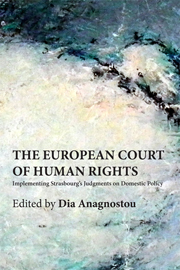Book contents
- Frontmatter
- Contents
- The contributors
- Acknowledgements
- Introduction: Untangling the domestic implementation of the European Court of Human Rights' judgments
- Part I INSTITUTIONAL DYNAMICS OF DOMESTIC IMPLEMENTATION
- 1 The interrelationship between domestic judicial mechanisms and the Strasbourg Court rulings in Germany
- 2 Between political inertia and timid judicial activism: the attempts to overcome the Italian ‘implementation failure’
- 3 The reluctant embrace: the impact of the European Court of Human Rights in post-communist Romania
- Part II LEGAL MOBILISATION AND THE POLITICAL CONTEXT OF IMPLEMENTATION
- List of European Court of Human Rights judgments and European Commission on Human Rights cases
- Index
2 - Between political inertia and timid judicial activism: the attempts to overcome the Italian ‘implementation failure’
from Part I - INSTITUTIONAL DYNAMICS OF DOMESTIC IMPLEMENTATION
Published online by Cambridge University Press: 05 April 2014
- Frontmatter
- Contents
- The contributors
- Acknowledgements
- Introduction: Untangling the domestic implementation of the European Court of Human Rights' judgments
- Part I INSTITUTIONAL DYNAMICS OF DOMESTIC IMPLEMENTATION
- 1 The interrelationship between domestic judicial mechanisms and the Strasbourg Court rulings in Germany
- 2 Between political inertia and timid judicial activism: the attempts to overcome the Italian ‘implementation failure’
- 3 The reluctant embrace: the impact of the European Court of Human Rights in post-communist Romania
- Part II LEGAL MOBILISATION AND THE POLITICAL CONTEXT OF IMPLEMENTATION
- List of European Court of Human Rights judgments and European Commission on Human Rights cases
- Index
Summary
The Italian legal system, as in every contemporary state, is not an isolated system, impervious to international and supranational legal rules. Far from it, it is part of a complex and broader legal community, where international institutions, in relation to their competences, play an influential role within the domestic system. Regarding the protection of human rights, the most important international regime bearing sustained influence on the Italian system is the European Convention on Human Rights (hereinafter ECHR), which has introduced an indirect system of control over national law. To be sure, the European Union, in whose foundation Italy played a central role, has also created a very strong system of rights protection following the jurisprudence of the Court of Justice of the EU (including the introduction of new rights, such as those concerned with the environment and privacy, that do not expressly appear in the Italian Constitution). In spite of its restricted competence on economic matters, the importance of the EU as a system that also protects human rights in a wider sense has been growing. Nonetheless, the revolution in the review of human rights for Italians is directly linked to the ECHR and its jurisprudence. In fact, the individual right to petition to the European Court of Human Rights (ECtHR) introduced to the Italian system the potential for individuals to directly address a rights review court. Nevertheless, the impact of the ECHR has been somewhat ambiguous and unclear, and its application by the domestic judiciary has not been immediate or uniform.
- Type
- Chapter
- Information
- The European Court of Human RightsImplementing Strasbourg's Judgments on Domestic Policy, pp. 49 - 70Publisher: Edinburgh University PressPrint publication year: 2013



